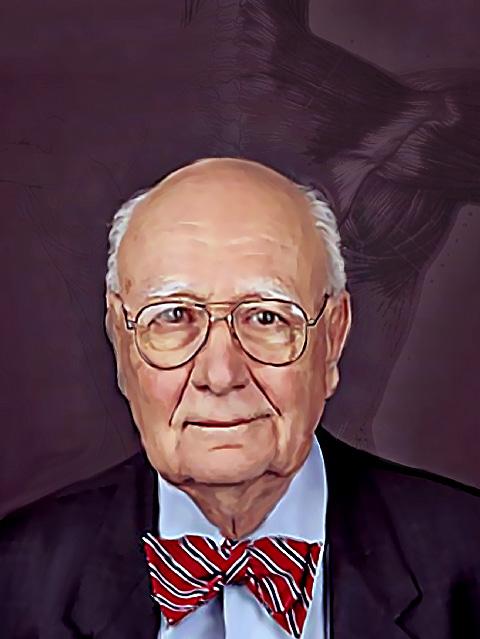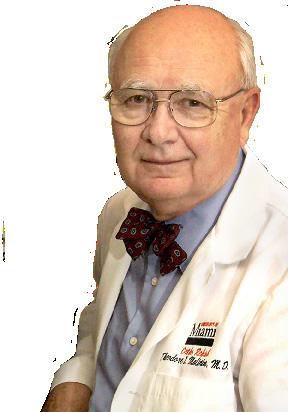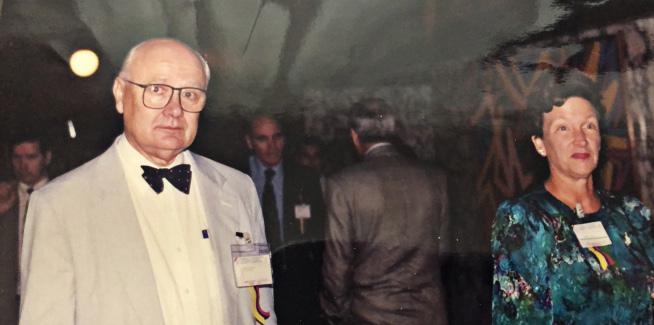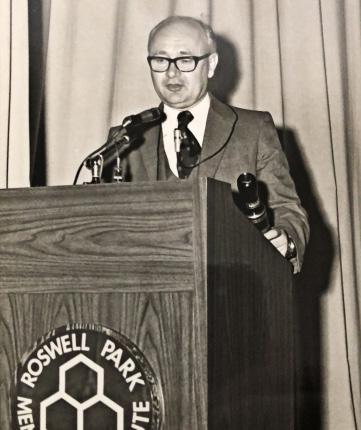
7 minute read
THEODORE I. MALININ '55
The Bone Collector
THEODORE I. MALININ ’55 ADVANCES THE FIELD OF ORTHOPAEDICS THROUGH TEACHING AND RESEARCH
Advertisement
Research conducted by Theodore I. Malinin in the field of orthopaedics has led to major advancements in the specialty while benefitting countless patients. A leading authority in such areas as tissue banking, cartilage structure, latent injury in cryopreservation of cartilage, and bone and tissue transplantation, Dr. Malinin has dedicated his life’s work to study, teaching and surgery.
He considers “the ability to help many people and the accumulation and dissemination of new knowledge” especially rewarding components of his distinguished career.
Theodore Malinin was born in Russia. “My family emigrated to the U.S. in 1949,” he says.
Early on, he was drawn to health care, working at a hospital as a youth. The experience provided him with guidance as to what direction his educational journey should take. He chose Concord for his undergraduate degree based on a recommendation from an administrator at the hospital.
“I was attracted to Concord College because we lived in Beckley and I had a weekend job at Beckley Hospital. Dr. A. U. Tieche, Superintendent of the hospital, recommended Concord College,” he explains.
As a student at Concord, Theodore belonged to Delta Delta Tau fraternity and had certain classes that he especially enjoyed.
“My favorite classes were those in zoology,” he says. “My favorite Professor was Dr. P. C. Bibbee, who was a sterling character, and who helped me a great deal. I have placed a brick at Concord in his memory. My other favorite professor was Dr. William Burnie, Professor of foreign languages.”
Reflecting on how Concord has impacted his life, he says, “Concord College has helped me in my career by broadening my horizons and in addition to general education, provided an introduction to science as well as liberal arts including literature, theater and music.” »


Theodore graduated from Concord in 1955 with a He has contributed to chapters in books, editorial bachelor’s degree in biology. He went on to earn a master’s papers and review articles, and has several books to his degree in anatomy from the University of Virginia (UVA) credit. Among these are: “Microcirculation, Perfusion and in 1958 and his medical degree from Transplantation of Organs” (1970) with the UVA Medical School in 1960. Linn, Callahan and Warren; “Surgery
He completed fellowships in and Life: The Extraordinary Career of anatomy and pathology at UVA. A Alexis Carrel” (1979); “Cancer Merthird fellowship took him to England chants: History of NCI’s Viruses and to serve as a National Foundation Cancer Program” (2008); and “MusFellow in the Department of Pathol- culoskeletal Tissue Transplantation ogy at the University of Cambridge. and Tissue Banking” (2013) with H.T. He interned in pathology at Johns Temple. Hopkins Hospital in Baltimore. He holds an impressive number of
Dr. Malinin began his work with patents dealing with a variety of topics tissue banking and tissue transplanta- such as cartilage material, instrumention early in his career. When he be- tation, osteochondral allografts, and a came affiliated with the United States method for regenerating cartilage. Public Health Service at the National Other especially notable accomCancer Institute in Bethesda, Md. in plishments in Dr. Malinin’s career the early 1960s, he was asked to come include his work with Charles A. up with a program whereby research- Lindbergh on organ perfusion and ers would have human tissue available Concord College student Theodore Malinin transplantation of massive allografts for to them. To aid in this project, he was dispatched to the limb salvage surgery. U.S. Navy Tissue Bank for training. Additionally, he says, “study of biology and structure
He also worked as a surgeon while he was with the articular cartilage, transplantation of the same and the NCI in Bethesda and later taught Pathology at George- development of microparticular town University’s School of Medicine and Dentistry in bone and cartilage allografts” Washington. D.C. make the list of his profes-
Dr. Malinin went on to organize research tissue banks sional highlights. at several institutions, and in 1970 established the Univer- “Early on I obsity of Miami Tissue Bank. It is the longest running facility served accumulation of of its kind in the United States. Dr. Malinin served as protein in cancer cells. director from its inception until retiring from the position Eventually studies such in 2005. He considers his work with this tissue bank one of as these resulted in prothe highlights of his career. Joining the University of Miami School of Medicine in 1970, Dr. Malinin has served the institution in a variety of leadership positions through the years. These include: Professor of Surgery and Director of Surgical Research Laboratories (1970-1990); Professor of Orthopaedics and Rehabilitation (1979-2013); and Associate Chairman for Academic Affairs, Department of Orthopaedics and Rehateomics,” he added. Dr. Malinin has contributed his wisdom, knowledge and expertise to an extensive list of directorships and committee memberships throughout his career. bilitation (1991-2006).
Along with his duties at the University of Miami, Dr. Malinin was a staff physician in the surgical service at the Veterans Administration Hospital in Miami from 19701978. He served with the United States Public Health Service from 1961-2011 rising to the rank of Captain. In 1980 he returned to the University of Cambridge to serve as a visiting scholar with King’s College.
A prolific writer and researcher, Dr. Malinin has presented his work extensively in medical journals and scientific papers and at scientific meetings, both nationally and internationally. Presenting at medical gatherings in major cities across the United States including New Orleans, Atlanta, Chicago, Houston and San Francisco, he has also traveled to Aruba, Puerto Rico and Japan to share his work.

Theodore Malinin and his wife Dorothy at the Congress of the Latin American Orthopaedic Society.

Naming a few, he has served on the Research Committee for the American Cancer Society, Florida Division; as Co-Chairman of the Tissue Banking Committee, South-Eastern Organ Procurement Foundation; and as a member of the Task Force on AIDS, American Academy of Orthopaedic Surgeons.
Additionally, he has been a member of the Board of Directors for the European Bone Bank Foundation, Rotterdam, Netherlands, and the Board of Directors of Cosmas y Damian Foundation Tissue Bank,

Dr. Malinin presents a lecture at Roswell Park Memorial Institute. Bogota, Colombia. He is currently a member of the Board of Trustees of the Mannheimer Foundation, Homestead, Fla.
Dr. Malinin holds membership in more than 20 professional societies. Among these are the American Association for the Advancement of Science; the American Society for Investigative Pathology; the American Academy of Orthopaedic Surgeons; The Johns Hopkins Medical and Chirurgical Society; The Royal Society of Medicine; The American Medical Association; The American Association for Cancer Research; The Pathological Society of Great Britain and Ireland; and, the American Association of Tissue Banks.
His awards and honors include Order of Caballero, Javeriana University; Order of Merit, Republic of Colombia; and Rotarian of the Year award, Rotary Club of Miami. He received an honorary doctor of science degree from the University of Scranton and the Distinguished Faculty Scholar Award from the University of Miami. The American Association of Tissue Banks honored him with the George W. Hyatt Memorial Award and he recently received the Albert Nelson Marquis Lifetime Achievement Award from Marquis Who’s Who.
Having retired from the University of Miami, Dr. Malinin is now an Emeritus Professor there. In retirement, he is continuing several professional activities.
“I serve as a Medical Director of Osteolife Biomedical, a company engaged in making allografts for restorative dentistry and oral and maxillofacial surgery,” he says. “I also do some writing and some lecturing.”
In the area of civic and community involvement, he is a member of the Rotary Club of Miami. His pastimes include reading, tennis, music, travel and enjoying the outdoors. He lives in Key Biscayne, Fla.
Dr. Malinin and his wife, Dorothy, have four children, eight grandchildren and two great-grandchildren. The Malinin siblings have been successful in a variety of careers.
“My eldest daughter is retired from the University of California at Los Angeles. She was a Professor of Psychiatry there. She is now a Program Director at the National Science Foundation. My son is an architect and lives in Colorado,” their father says. “My other daughter is an attorney for the EPA. My youngest son is a musician. He is a band leader for Tanya Tucker.”


